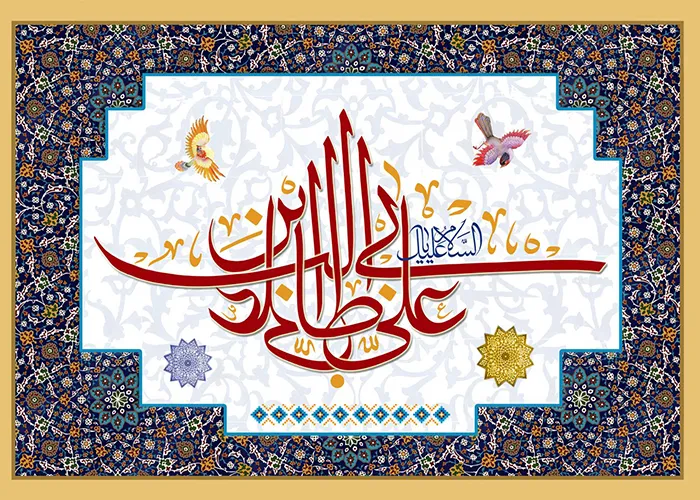Topic of the Week – Volume01 Issue26
A Glimpse into the Fatimi Lifestyle (Part Two)
Seyed Hashem Moosavi
In the first part of this article, we examined the “Fatimid Lifestyle” based on the moral and spiritual conduct of Lady Fatimah al-Zahra (peace be upon her). By focusing on the concept of “God-centeredness” in her life, we highlighted practical examples of her absolute devotion to God and sincere servitude in areas such as supplication, prayer, and worship. Through this exploration, we aimed to provide a clear depiction of a lifestyle rooted in pure servitude, offering a model for humanity on the path to true happiness.
In this section, God willing, we will strive to explore other teachings from her life that are highly instructive for today’s generations in illustrating a God-pleasing lifestyle.
- An Ethical Approach in Personal and Social Life
Islamic ethics is one of the most significant pillars of Lady Fatimah al-Zahra’s (peace be upon her) lifestyle. In her personal and social relationships-whether with her family or other she consistently reflected Islamic ethics through affectionate speech, kind behaviour, self-sacrifice, and forgiveness, embodying the essence of Islamic morality.
Here, we highlight a few examples of her conduct rooted in Islamic moral teachings:
- Respect and Affection for the father
One of the most serious challenges faced by modern families is the erosion of respect for elders and the abandonment of affection towards them-whether parents, siblings, or other members of society. Unfortunately, as we advance toward modernity and adopt contemporary lifestyles, this challenge deepens and becomes increasingly catastrophic, leaving only a faint hope for resolution.
Undoubtedly, one of the primary causes of such challenges in Islamic societies is the growing distance from their rich cultural teachings which have for centuries introduced Islamic culture as one of the most progressive and exemplary civilizations in human history. These teachings can be discovered through the study of the Qur’anic verses and the moral conduct of individuals who have been introduced as role models by the Qur’an and narrations.
Lady Fatimah al-Zahra (peace be upon her) is one of the most outstanding examples of such moral role models. Emulating her lifestyle offers an effective solution to the challenges faced by humanity today. Her behaviour towards her noble father, the Holy Prophet Muhammad (peace and blessings be upon him and his family), and her honourable husband, Amir al-Mu’minin Ali (peace be upon him), presents a clear and shining example of Fatimid ethics. This respect and affection serve as an eternal model for families across all ages and societies.
Lady Fatimah’s (peace be upon her) interactions with her father were characterized by utmost respect and humility. She always strove to honour and revere the Prophet Muhammad (peace and blessings be upon him and his family) before anyone else. Although the relationship between this father and daughter was deeply emotional, filled with affection and intimacy, it did not prevent her from expressing the highest level of respect towards him as the Prophet of God.
Lady Fatimah (pbuh) herself narrates, “When the verse was revealed commanding people not to address the Prophet by his name, the awe of the Prophet overwhelmed me. I could no longer call him ‘Father’ and instead addressed him as ‘O Messenger of Allah’ as the Qur’an required. The first time I did this, he did not respond and turned away from me. I repeated it several times, yet he did not reply. Finally, he said, ‘My dear daughter, calling me ‘Father’ is more beloved to me, and Allah is also more pleased with it.’”
Her respect and reverence for her father were so profound that, while she was engaged in nawafil (supererogatory prayers), upon hearing the voice of the Prophet (peace be upon him and his family), she immediately abandoned her prayer, went to him, and greeted him. In response, the Prophet (pbuh) placed his blessed hand on her head and prayed for her.
The extent of Lady Fatimah’s love, respect, and support for her father was so remarkable that the Holy Prophet (peace and blessings be upon him and his family) would often refer to her as “Umm Abiha – Mother of Her Father.” This title reflected the depth of care and affection she showed, embodying both the love of a devoted daughter and the profound respect for the Messenger of God.
- Respect and Affection Towards the Husband
The mutual love and respect between Lady Fatimah (peace be upon her) and Imam Ali (peace be upon him) are widely renowned. Their marital life was built upon affection, respect, and mutual cooperation. Imam Ali (peace be upon him) beautifully described their life together by saying, “By God, during our entire life together until the moment when the Almighty took her soul, I never angered or forced her into anything, and she never angered or disobeyed me. Whenever I looked at her, my sorrows and griefs would disappear.”
According to narrations, including the Hadith al-Kisa (The Narration of the Cloak), Lady Fatimah (peace be upon her) always addressed her husband with utmost respect. Sometimes she would refer to him by his kunya (honorific title) “Abu al-Hasan” (Father of Hasan), and at other times she would call him “Ibn Ammi” (my cousin), reflecting their familial bond with affection and esteem. This respectful form of addressing one’s spouse highlights an essential aspect of a healthy and dignified marital relationship.
Another notable example of Lady Fatimah’s respect toward her husband can be seen in an incident related to her final days. Two individuals who played a significant role in her suffering and injuries sought permission to visit her. Imam Ali (peace be upon him) presented their request to Lady Fatimah (peace be upon her). In response, she said: “The house is yours, and I am but your servant.”
This humble yet profound statement reflects her deep respect, devotion, and acknowledgment of Imam Ali’s authority as the head of their household, even under extremely difficult and painful circumstances.
- The Approach to Helping the Needy
One of the most natural outcomes of a God-centred approach to life is caring for the needs of others and striving to alleviate their hardships. Conversely, a self-centred approach, focused on maximizing personal gain, becomes the greatest barrier to helping others and eradicating poverty and deprivation in society.
Unfortunately, modern lifestyles have charted a path where the primary concern and focus of people are on accumulating wealth and securing personal interests. As long as behavioural patterns inspired by God-centred living remain forgotten, the sorrowful tale of humanity will persist.
Lady Fatimah al-Zahra (peace be upon her) stands as one of the brightest examples of God-centred conduct, particularly in her lessons on helping the needy. Her life is filled with inspiring and awakening teachings that emphasize compassion and self-sacrifice.
The well-known incident of Lady Fatimah gifting her wedding dress to a poor person highlights her unwavering attention to the needs of others and her spirit of sacrifice in every moment of her life. On her wedding night, she gifted her finest dress to a beggar. When the Prophet Muhammad (peace and blessings be upon him and his family) learned of this and asked for the reason, she replied: “The Almighty God has said in the Holy Qur’an: ‘You will never attain righteousness until you spend [in charity] from that which you love’ (Qur’an 3:92).”
In the book “The Sayings of Fatimah”, page 119, another story is narrated that further illustrates her lifestyle and the moral lessons embedded within it-lessons that teach no one can remain indifferent to the needs of the poor in society. The author writes,
“A newly converted Arab came to the mosque in Medina seeking help. The Prophet Muhammad (peace and blessings be upon him and his family) turned to his companions. Salman al-Farsi rose to fulfil the man’s need but returned empty-handed after trying. Disheartened, he passed by Lady Fatimah’s house and thought to himself: ‘Fatimah is the fountain of goodness.’ He knocked on her door and explained the plight of the needy man. Lady Fatimah (peace be upon her) replied: ‘O Salman, I swear by the God who chose Muhammad as a Prophet, we have not eaten for three days, and my children Hasan and Husayn (peace be upon them) are restless with hunger and have fallen asleep out of exhaustion. Yet, I cannot turn away someone in need who knocks on my door.’
She then took off her garment and gave it to Salman, asking him to pawn it in the market for dates and barley. Salman narrates: ‘After obtaining the dates and barley, I returned to Lady Fatimah’s house and said, ‘O daughter of the Messenger of God, please take some of this food for your hungry children.’ She replied, ‘O Salman, we did this solely for the sake of God, and we will take nothing from it.’”
This story reflects the profound selflessness and God-centred nature of Lady Fatimah’s lifestyle. Her actions teach that in a truly virtuous society, no one can remain indifferent to the suffering and needs of others.
This lifestyle of selflessness and sacrifice might be seen by some as excessive; however, the Almighty God has praised and honoured such actions, presenting them as exemplary models of human behaviour.
In the narration regarding Lady Fatimah al-Zahra’s (peace be upon her) act of giving away her wedding dress, it is reported that, in recognition of her generosity and self-sacrifice, God sent Gabriel to the Holy Prophet (peace and blessings be upon him and his family). Gabriel said, “God has commanded me to tell you that, in reward for this sacrifice, He will grant anything you desire.” Lady Fatimah (peace be upon her) replied that she wished for nothing. Gabriel descended once again and conveyed that God insisted, He would grant whatever she asked for. At this moment, the Siddiqa al-Kubra (the Great Truthful Lady) entrusted her request to her noble father. The Prophet (peace and blessings be upon him and his family) raised his hands in supplication and prayed to God to forgive all Muslims and grant them a place in Paradise. This event is beautifully reflected in Surah al-Duha with the verse:
“And surely your Lord will give you so much that you will be pleased.” (Qur’an 93:5)
Similarly, in the incident of feeding the needy, orphan, and captive, God praised the actions of the Ahl al-Bayt (including Lady Fatimah, peace be upon her) by revealing the following verse, which affirms and highlights their virtue:
“And they give food, despite their love for it, to the needy, the orphan, and the captive, saying: ‘We feed you only for the sake of Allah; we desire neither reward nor thanks from you.’” (Qur’an 76:8-9)
These examples serve as profound illustrations of a lifestyle that Lady Fatimah (peace be upon her) implemented and that God Himself affirmed and endorsed. In today’s world, more than ever, humanity desperately needs to learn and adopt these principles as a means to overcome the challenges posed by modern, demanding lifestyles.
news via inbox
Subscribe to the newsletter.




